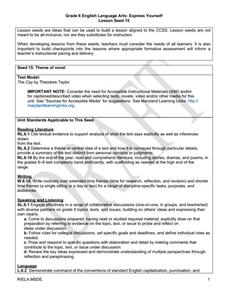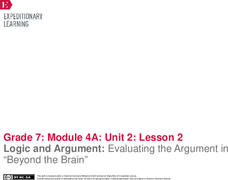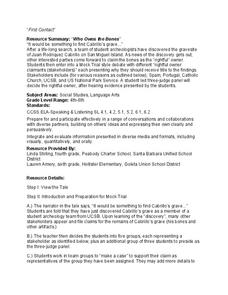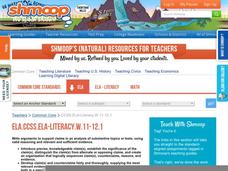Curated OER
Nonfiction Genre Mini-Unit: Persuasive Writing
Should primary graders have their own computers? Should animals be kept in captivity? Young writers learn how to develop and support a claim in this short unit on persuasive writing.
Texas Education Agency (TEA)
Evaluating the Effectiveness of Arguments, i.e., Identify Fallacies (English III Reading)
A series of interactive exercises provide users with the ammunition they need to detect logical fallacies and defend themselves against persuasion. Learners read about 11 types of logical fallacies and identify the type used in sample...
ReadWriteThink
Analyzing Famous Speeches as Arguments
A speaker, a message, an audience. After analyzing these elements in Queen Elizabeth's speech to the troops at Tilbury, groups analyze how other speakers use an awareness of events, and their audience to craft their arguments....
Fluence Learning
Writing an Argument: The NIEHS
Should the work of the National Institute of Environmental Health Sciences be funded by the government? Middle schoolers weigh in on the status of federal funding for programs that protect the environment with three text passages and...
New York State Education Department
English Language Arts Examination: June 2017
Plants prefer classical music to rock and roll. That's one of the claims in an informational passage that makes up part of a set of standardized assessment questions. The set is part of a larger collection of English language arts tests...
Curated OER
Express Yourself Lesson Seed 15: Theme
Build understanding of theme with an activity designed for The Cay and the Common Core. Small groups or pairs use graphic organizers to determine themes, find and record related details from the text, and formulate theme statements. In...
Curated OER
Argument in an Athenian Jail: Socrates and the Law
Students read and discuss Socrates's "Crito" and examine the arguments he made supporting his own death penalty. They consider the still-relevant debate between the rights of the individual and the rule of law.
C3 Teachers
2020 Protests: Is There Anything New about the 2020 Protests?
Are marches and protests an effective form of resistance? That is the question high schoolers seek to answer in this inquiry lesson as they compare the 2020 protests to historical ones. Researchers use Venn Diagrams to compare images...
Curated OER
Building a Better Argument
Students create good arguments by exploring the basic structure of an arguments. They determine premises and conclusions for analyzing the effectiveness of arguments. In addition, they explore the differences between arguments and...
EngageNY
Logic and Argument: Evaluating the Argument in “Beyond the Brain”
The brain is not the mind. Scholars explore the claim by reading an informational article about neuroscience research, "Beyond the Brain." As they read, they answer text-dependent questions and complete an anchor chart to evaluate...
EngageNY
Analyzing the Model Essay: Studying Argument (Chapter 27 Plus Synthesis of Scenes in Previous Chapters)
Scholars partner up to review a model essay and talk through the process leading up to writing their essays. During a second reading of the essay, learners locate and underline the claim given, reasons, and counterclaim. They then...
EngageNY
Analyzing the Central Claim and Supporting Claims: “The Shakespeare Shakedown”
Scholars continue to analyze Simon Schama's article "The Shakespeare Shakedown." They participate in a jigsaw discussion to identify the author's argument and supporting claims. Pupils also write objective summaries of the text.
EngageNY
Forming a Research-Based Claim: Comparing Cascading Consequences
It's time to weigh the risks and benefits of screen time! Pupils work in triads to identify the strongest positive and negative consequences from their Cascading Consequences chart. Next, using the chart and their researcher's notebooks,...
EngageNY
Forming a Research-Based Claim: Analyzing Risks and Benefits for Stakeholder
Welcome to the World Café, where lively debate is on the menu! Scholars participate in the World Café protocol, moving between discussion groups to decide if the American Academy of Pediatrics should increase its adolescent screen time...
Curated OER
Is That a Fact?
Investigate popular scientific claims and gather evidence to defend or argue against an author's stance. Writers synthesize information and compose their own "Really?" columns modeled after those found in the weekly "Science Times"...
Curated OER
Campaign Trailblazers
Explore the backgrounds, qualifications, and platforms of the presidential candidates for the 2000 election. Though the lesson is outdated, the activities within the informational text could be good practice for your young learners as...
Turabian Teacher Collaborative
My Favorite Martian: Workshopping Warrants
Sometimes explaining an argument can lead to confusion and miscommunication. Narrow down the details in written arguments with a group activity in which learners pretend to be aliens from another planet, struggling to understand each...
Channel Islands Film
Who Owns the Bones
A study of the history of the Channel Islands, located off the coast of southern California, continues as class members conduct a mock trial to determine which group of stakeholders should have the right to claim the remains of Juan...
Turabian Teacher Collaborative
Introductions: Formulating Problem Statements
Describing a problem efficiently doesn't solve it, but a well-crafted argument can move readers to action. High schoolers focus on structuring problem statements by reading examples of strong essays and working in groups to create their...
EngageNY
Pitching Your Claim with Best Evidence
Does Bud use his rules to survive or thrive? That is the driving question of a lesson plan following the reading of Bud, Not Buddy by Christopher Paul Curtis. In an argument essay prewriting activity, pupils use textual evidence to...
EngageNY
End of Unit 2 Assessment, Part 1: Drafting The Argument Essay
Scholars write the draft of their essays about Atticus's decision to defend Tom Robinson in Harper Lee's novel To Kill a Mockingbird. They support their claims with reasons, details, and quotes from the novel.
Channel Islands Film
Santa Cruz Island - Writing for Information
After re-viewing a documentary segment on the restoration of Santa Cruz Island,, individuals craft an essay in which they compare the views of the various stake holders featured in the video and identify the point of view they find the...
Curated OER
Organizing Your Argument
Constructing a well-organized argument is the focus of this tutorial, originally created for the Purdue University writing program. The slides can be adapted for any composition course or writing unit.
Shmoop
ELA.CCSS.ELA-Literacy.W.11-12.1
Focus on writing argument essays with your high schoolers. The lesson suggested here focuses on The Jungle, by Sinclair Lewis; however, the idea could be adapted for other texts. Check out the quick quiz provided at the end of the...

























